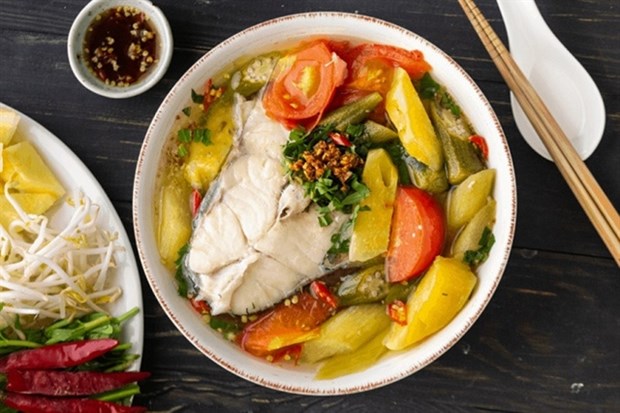Vietnam's popular sour fish soup recognised among top ten by TasteAtlas
Sour fish soup (locally known as canh ca chua), a very popular dish in Vietnamese daily meals, has been recognised, for the first time, among the top 10 Best Rated Fish Soups in the world by TasteAtlas, the home of local food, traditional restaurants, and authentic recipes.
 Traditional sour fish soup is a favourite dish among people in their daily meals, particularly in the summer. (Photo: congly.vn)
Traditional sour fish soup is a favourite dish among people in their daily meals, particularly in the summer. (Photo: congly.vn)Sour fish soup is a common name for a number of Vietnam's specific fish soups that feature a harmonious combination of sweet, sour, and peppery flavours. The soup broth is often cooked with tamarind, pineapple, tomato, okra, green bean sprouts and other vegetables. The fish used include catfish, carp, snakehead fish, salmon and others. The cooked soup is often topped with fresh onion, cilantro and other herbs. It is typically eaten with rice, TasteAtlas said.
In the northern region, sour fish soup is cooked with dracontomelon or fruit of a plant named 'Garcinia cowa', or qua doc in Vietnamese. Sugar is not used in order to preserve the natural flavour of the ingredients.
Meanwhile, cooks in the country's southern and southwestern regions often add some sugar to the soup along with very hot chilli, said professional chef Pham Tuan Hai, one of the judges of the Vietnam Master Chef Programme. He added that although each region has its own recipe to cook the dish, the completed dish maintains a lightly sweet and sour flavour from cooked ingredients such as fruits and aromatic herbs.
Hai recalled that he would never forget the special taste and aromatic flavour of the soup cooked by his grandmother during his childhood. It was also during Vietnam’s war and post-war periods when most local households were poor, so having a bowl of sour fish soup was a great effort by his grandmother.
"My grandmother cooked the dish once a week during summer time, particularly on severely hot days to help us increase our resistance to the heat.
"Like other northern cooks, my grandmother would often buy a fresh snakehead fish and fry it before cooking it with one or two dọc fruits. She would grill the fruits until they became yellow, then peel off their skin to cook the dish. I helped my grandmother by cutting banana flowers into pieces, soaking them in water, and washing the fresh herbs," said Hai.
To make the dish fragrant, his grandmother cleaned the fish very carefully with salt, lime juice or white wine to eliminate the fishy smell. She cut the fish into three or four parts before marinating it with fish sauce, broth mix, and spice for half an hour, he said.
"My grandmother would fry the dried onion in cooking oil for a while, then add tomato pieces, dọc fruits and fish into a pot of boiling water over medium heat and cook it for 10 minutes. She also ground fresh turmeric to extract its juice to add to the pot before turning off the heat," Hai said.
He added that when his grandmother scooped the fish soup into a big bowl, it was very attractive: the fish was a light yellow colour, surrounded by red tomato pieces and topped with green onions and fresh herbs. It was served with a bowl of sauce made from a bit of sugar, minced garlic, and fresh chilli cut into pieces.
"We enjoy the dish so much for its natural sweetness and sourness from the fruits and herbs, particularly the fragrance from the cilantro. The dish gives us a very good appetite to finish our meal despite the heat," Hai said.
In modern days, despite the much-improved living standards of the people, traditional sour fish soup is still most chosen not only in the summer, but also in the winter to warm the body.
According to their taste, they choose different fish, such as carp, to cook with sour bamboo or the thick and fleshy taro petioles, often eaten with rice noodles. These variations are also very enjoyable, Hai noted./.












